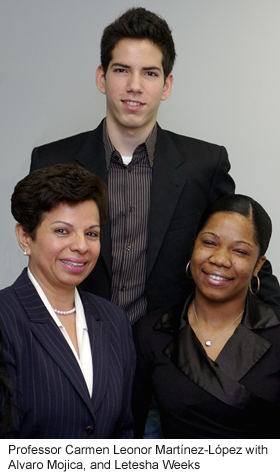
If there is one thing Carmen Leonor Martínez-López looks to impress upon her students, it’s that the study of business is best approached in an international context.
“In both our Introduction to Business and Business Management & Organization courses, there is a strong emphasis on the international nature of business today,” says Martínez-López, an assistant professor in the Department of Business Management. For example, students in her introductory course (Business 104) are responsible for researching and writing an in-depth study of a foreign country, focusing on a broad range of issues as they relate to the country’s place in the international business community. In Business Management & Organization (Business 200) which integrates issues associated with both domestic and international corporations students study a specific company in depth and write a paper based on what they have learned.
Reaching out to the world
“I’ve learned an enormous amount about business – including the vocabulary and basic concepts – in a very short time,” says Alvaro Mojica, a first-semester student in the Introduction to Business course. “One of the most valuable things I’ve gained in the course is an understanding of how international business infuses every aspect of our lives. You interact with it every time you go into a store to make a purchase.” Born in Colombia, Mojica has chosen Germany as the subject of his term project. “I’m hoping to become an entrepreneur – and, if possible, to establish an overseas presence for my company,” he says.
Classmate Letesha Weeks, who was born and raised St. Kitts and Nevis, is researching Trinidad, “the most industrialized nation in the Caribbean.” Trinidad “is blessed with abundant natural resources – especially petroleum – on which it has built a strong economy and healthy balance of payments surplus,” says Weeks, who plans to become an economist. “In that regard, Trinidad stand apart from its Caribbean neighbors – and that whetted my curious about the country.”
Tanya Matthews, a native New Yorker and student in Martínez-López’s Business Management & Organization course, is conducting an in-depth study of CooperKatz & Co., a public relations firm, as part of her term project. “From my interviews with the firm’s CEO Meredith Topalanchik, I’ve learned how important it is for a service firm to be really hands-on in its dealings with clients – in this case, Zipcar,” Matthews says. “Meredith and her team make a point of really knowing the company before they go into meetings with them. What’s also struck me was how the firm welcomes ideas and input from all its employees – even to the extent of inviting me to participate actively in brainstorming sessions.”
Words on paper
One point of differentiation between Business 104 and 200 is the latter’s heightened emphasis on writing. “This was a major plus for me, since I’m the type of person who learns best through writing,” says Amir Ali, who is majoring in video arts and technology. “The more notes I take during lectures, the better I understand what’s being discussed.” In studying Open Media LLC, a print and graphics company, he says, “I’ve learned how critically a company’s profitability and ability to attract new clients are dependent on its ability to fully utilize its resources – which in turn requires an emphasis on organization and strategy.” Writing his paper on Open Media has given him new insights into the role of planning, decision-making, strategy and organization in both a company’s day-to-day operations and long-term viability.
“If not for the paper and Prof. Martínez-López’s classes, I would have gone on thinking of working as only a nine-to-five proposition. It isn’t – not if you want to make a success of it.”

